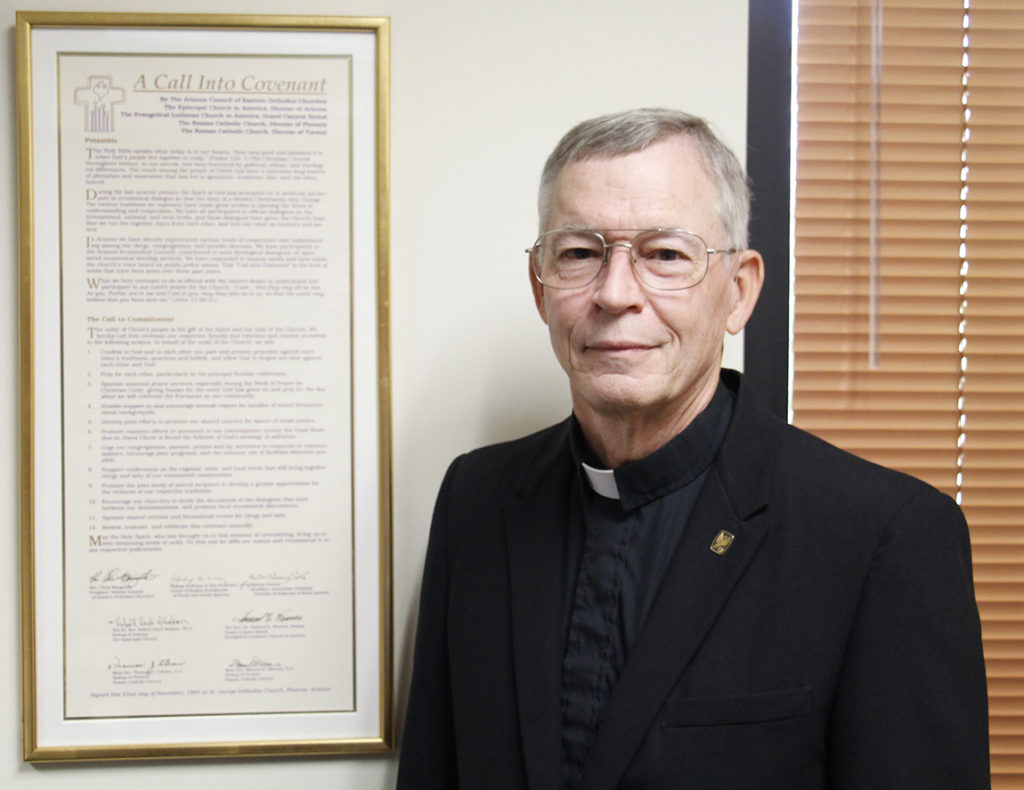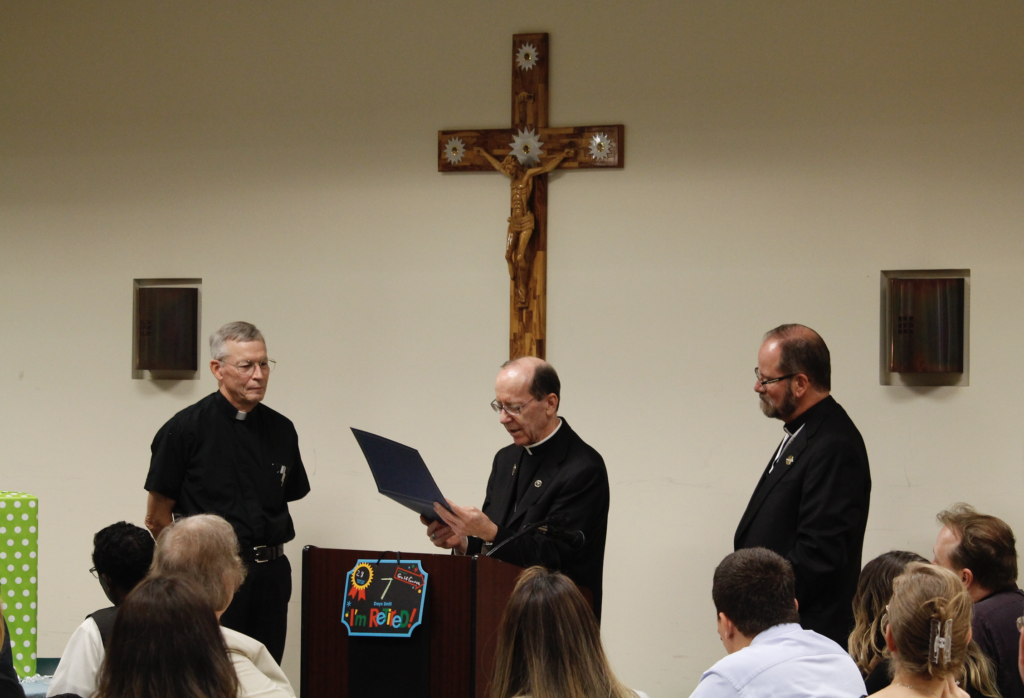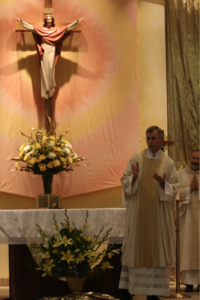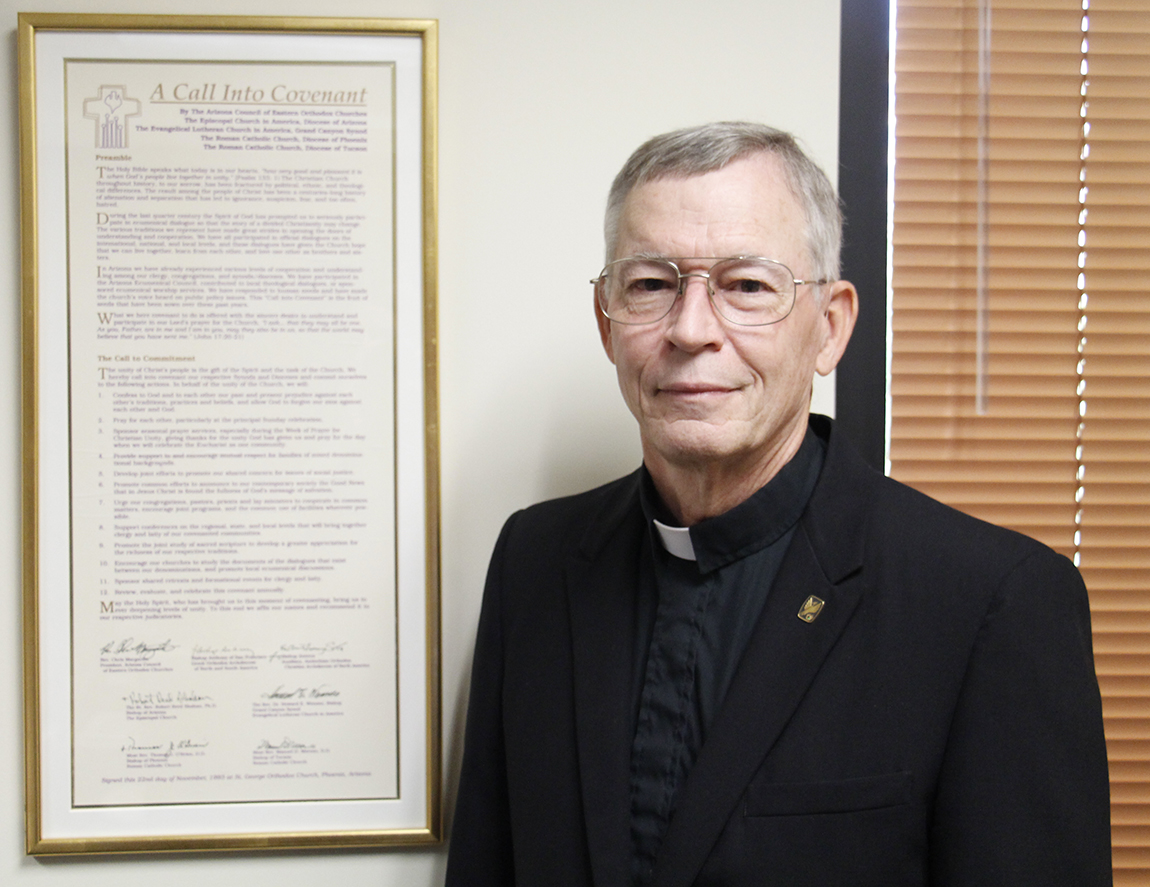
The last hard-sided briefcase has likely left the Diocesan Pastoral Center.
“It was his signature item,” Maria Chavira, chancellor, said of her assistant counterpart. It was a role Fr. Michael Diskin held for 28 years until his retirement Sept. 28. Fr. Diskin spent more than a decade prior serving at eight diocesan parishes plus one in his home state of New York since his ordination in 1977.
Most, if not all briefcases coming into the DPC these days, have been replaced with softer-sided computer bags and tablet covers.
Fr. Diskin was computer savvy too, but accomplished vital ministry via phone and face-to-face conversations, whether it was a quip with staff or conversation with laity.
“Fr. Diskin had many priestly gifts but the ones I remember are his ability to listen and respond pastorally to individuals who were experiencing dissatisfaction with the Church. Fr. Diskin had a unique way of putting things into perspective and offering people possible solutions to the issues they were struggling with,” Chavira said.
One struggle the priest himself personally couldn’t get through was his quest to have a “fro yo” machine installed in the cafeteria. Fr. Diskin said at his retirement celebration he would happily come back to bless it should one get installed.

Interfaith networking
Most of Fr. Diskin’s work in the chancery also included double duty as diocesan director of ecumenism and religious affairs. He was appointed as the Catholic representative with the Arizona Faith Network, though it went by another name until 2015. Fr. Diskin served as president of its board of directors and other positions. The Festival of Faith at Bank One Ballpark in 2000 was among its fruits. Some 35,000 people attended a four-hour celebration.
“The most significant change is when the Arizona Ecumenical Council ultimately went through the process of making a decision that in today’s environment, we don’t just need to be ecumenical, but interreligious,” Fr. Diskin said.
Interreligious coverage in The Catholic Sun
Its focus on common social justice issues helped raise Arizona’s minimum wage and Fr. Diskin was specifically involved with an effort to change city bus schedules to help the working poor.
“His great heart was for continuing doing some service in the community with justice issues,” said the Rev. Larry Fultz, executive director of Arizona Interfaith Movement — another local interreligious organization.
“I know he’s going to be missed by the Church. I know he’ll be deeply missed by the faith community, not just the Catholic community, but the faith in general,” Fultz said.
Auxiliary Bishop Eduardo A. Nevares, who served with Fr. Diskin in interfaith efforts, agreed. “Your spirit, your generosity, your kindness, your sense of service have been very admirable over the years,” he said at a retirement celebration.
Serving Catholics worldwide

That sense of service also meant wearing a third hat as short-term canonical administrator of St. Bernard of Clairvaux and seven years as pastor of St. Louis the King in Glendale.
“In parish ministry, you have direct interaction with members of the faithful. You share their pain and disappointment and their joy in significant life moments,” Fr. Diskin said.
Early into priesthood, he initiated fellowship efforts among freshmen priests. Fr. Diskin rounded up clergy who had been ordained five years or less for social gatherings, whether it was basketball, dinner theater or a trip to Lake Havasu City.
“He loves the Church. He humbly handles the Church behind the scenes,” Bishop Thomas J. Olmsted said.
Fr. Diskin established such modus operandi long before ordination and seminary. He was a daily Massgoer for most of college and supported three ministries in an Army base chapel in Germany. It was bedside reading there from St. Paul that served as his decision point for discerning priesthood.
The Lord first spoke to his heart around age 10 or 11 though upon discovery of a side altar at his home parish honoring the Blessed Mother.
“There was something that took place that stimulated being open to priesthood,” Fr. Diskin recalled, while in his final days at the Diocesan Pastoral Center. The rest is history that has a new chapter waiting to be written.







